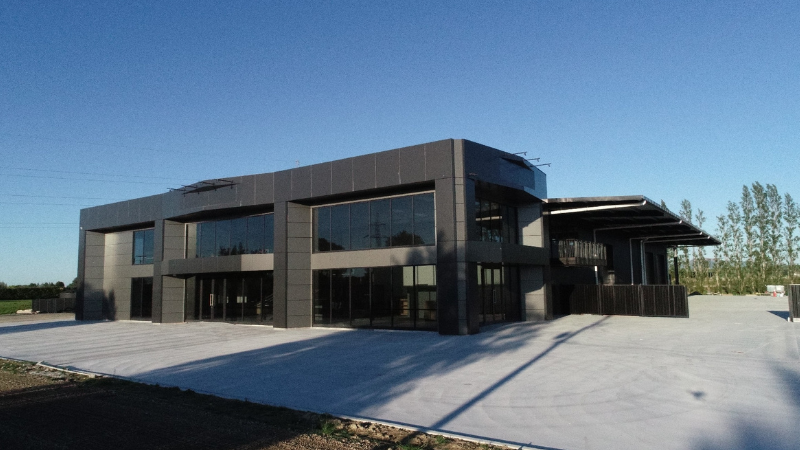Owning VS Renting my commercial premises, what is best for me?
/Shade%20Systems%20exterior.jpg?width=800&height=600&name=Shade%20Systems%20exterior.jpg)
As an owner of a small or medium business, you might be looking at your rental cost/future business plans and considering becoming an owner-occupier of commercial property - whether it be offices, warehouses, or manufacturing facilities.
Everyone's circumstances will be unique and it is important to get proper financial and legal advice from suitably qualified professionals.
We get asked quite often if owning or renting a commercial premise is best so we have put together some points to consider if you are looking to own your own space.
The first question to ask yourself - or confirm with your team, is why you are considering owning your own property. In reality, there are only two main reasons why you would own a commercial building;
- It is a strategic move to get the right building to enable the business to grow or evolve.
- You are looking at it as an investment - or, to put it another way, to save paying the rent to someone else.
Let's explore both in this article below.
1. A new building is required for a strategic change in the business.
The concept of owning your own premises may have come up because you need to move into a new building for the next stage in business. Maybe you have outgrown where you rent now, or maybe you need a different type of building, for example, if you are going into a specific form of manufacturing.
Let's assume that the company has decided a new building is required and it's coming down to either renting or owning it yourself. Below are several things to consider and discuss with your management, accounting, and legal team.
- Do you have the capital to fund the building purchase? If you need to borrow, the amount banks lend is very much a case-by-case situation. Typically they will want more than if you were buying a residential property and interest rates will often be different from standard advertised rates. If you’re looking to build new, rather than buy an existing property you can use our calculator to get a budget estimate as a starting point.
- What rental expenses can the business sustain? This is crucial to model with your accountant, including scenarios where you may not achieve planned growth or the business shrinks.
- If you are moving for strategic reasons it may be that you have quite specific requirements and there isn't an option to buy an existing building, or an investor willing to fund a new build for a semi ‘bespoke property’. Again it is important to ensure that if you are building a semi-bespoke building (or in an area where there is less chance of capital gains) the returns enabled by the new building are high enough to outweigh these downsides.
- Will owning the building leave you with sufficient cash reserves to grow the business? It's wise to have a cash reserve or facility for either a downturn or sudden shock (like COVID) or to take up an opportunity like buying a complementary business or asset should it arise.
- Will your needs change again? If you are in a fast-growing business owning your premises may tie you down if your needs change again and you need a different type of building. Commercial buildings tend to be slower to sell or slower to secure a tenant than residential properties and you don't want to be suffocating your business with a building that you can't get out of.
2. I am looking at it as an investment
Maybe you don't need extra space or a new building, but feel like it would be much more beneficial to not pay someone else's mortgage or retirement plan.
- Consider the funding, cash flow, and loan requirements as mentioned above. Talking to a broker can be very beneficial as this can review your specific financial position and requirements and give advice accordingly.
- What do you plan to do with the business? - for example:
- If you’re planning to sell the business, the new owner may not want to use the building which leaves you to find a tenant or try and sell an untenanted property which is much less attractive.
- Is there a succession plan for a new generation of owners? In this case, there may be lots of benefits to owning the premises to give you another income.
- Is your building the best investment? If you have the cash from a business and are looking at property investment it would be sensible to look at all forms of property investment for example:
- Would another commercial property give me a better return on my money? E.g. you might have very favourable terms with a long-term landlord, if you were to purchase the building at current market rates this might mean the business needs to pay more rent to give you a decent return. You may be better off keeping the good deal running and becoming someone else's landlord.
- Would it put too many eggs in one basket? For example, maybe your building is worth $5m, you could be better to purchase 2-3 properties totaling $5m which spreads your risk.
- What if your business has a downturn? This leaves you with two challenges, getting the business back on track plus a ‘tenant’ who is struggling to pay the rent. This may be less of a challenge if you own it freehold, but if you have to meet repayments on a loan it could compound your problems.
- Residential vs Commercial investments
- An introduction to commercial property investment along with current market trends.
- Small business - own or rent your premises?
Other reasons you may want to own your premises
- No landlord; Some people just prefer not to be in another person's property or have to consult with the landlord, particularly if they have or have had a difficult landlord to deal with.
- Life Goal; Owning your premises can be a significant life goal and provide a strong sense of achievement and stability.
If you are strongly considering owning your own premises, it would be important to discuss a number of aspects with your lawyer and accountant in regard to:
- Ownership structure - will it be owned by the business or a separate entity? And if it will be a separate entity, will it be under a trust, company, or partnership?
- Lease agreements and terms.
- Budgets and financial models.
It can also be wise to talk to real estate agents about how the market is in the areas you are considering. You can find some agents through the links below:
If you have specific requirements in mind and want to discuss the options to build a new building, get in contact with our team at XL Structural. Our experts are happy to discuss your specific needs and how we can help bring your project to life.



